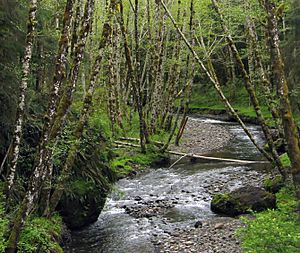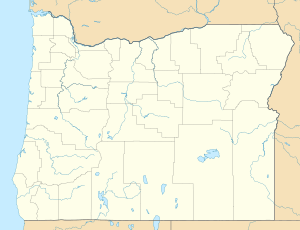Lewis and Clark River facts for kids
Quick facts for kids Lewis and Clark River |
|
|---|---|

Lewis and Clark River near its source at Saddle Mountain
|
|
|
Location of the mouth of the Lewis and Clark River in Oregon
|
|
| Country | United States |
| State | Oregon |
| County | Clatsop |
| Physical characteristics | |
| Main source | Northern Oregon Coast Range Saddle Mountain, Clatsop County, Oregon 2,100 ft (640 m) 45°57′49″N 123°38′21″W / 45.96361°N 123.63917°W |
| River mouth | Youngs River Youngs Bay, Clatsop County, Oregon 3 ft (0.91 m) 46°10′6″N 123°51′47″W / 46.16833°N 123.86306°W |
| Length | 20 mi (32 km) |
| Basin features | |
| Basin size | 62 sq mi (160 km2) |
The Lewis and Clark River is a cool river in northwest Oregon, United States. It flows for about 20 miles (32 km) and empties into the Youngs River. This river helps drain a big area of the Northern Oregon Coast Range, which is a mountain range. It joins the Youngs River just before it reaches the Columbia River at Youngs Bay.
Close to where the river meets Youngs Bay, you can find the spot where Fort Clatsop once stood. This fort was built by the famous Lewis and Clark Expedition. The river itself is named after the leaders of that expedition, Meriwether Lewis and William Clark.
Contents
History of the River's Name
The Lewis and Clark River has an interesting history. When Lewis and Clark first explored this area, they called it the Netul River. The Clatsop people, who were Native Americans living there, also knew it by this name.
The river kept the name Netul River for a long time. It wasn't until 1925 that it was officially renamed. The new name, Lewis and Clark River, was chosen to honor the famous explorers.
Lewis and Clark National Historical Park
The river flows through a special area called Lewis and Clark National Historical Park. This park was created in 2004. It helps protect the natural beauty and historical importance of the region. Visitors can learn about the expedition and the Native American tribes who lived there.
Fish and Wildlife in the River
The Lewis and Clark River is a great place for fish! It's home to several types of fish that are important for the local ecosystem and for fishing.
Sturgeon Fishing
One popular fish found here is the sturgeon. These are large, bottom-feeding fish. People enjoy fishing for sturgeon in the river.
Salmon and Trout Programs
The river is also very important for salmon. There's a big program to help salmon grow and return to the river. This program is run by the Oregon Department of Fish and Wildlife. You can sometimes see young salmon, called "fingerlings," swimming in special pens along the riverbanks.
Besides salmon, the river also supports other fish. You can find wild steelhead and cutthroat trout swimming in its waters. These fish are also important for the river's health.
 | Roy Wilkins |
 | John Lewis |
 | Linda Carol Brown |


